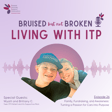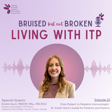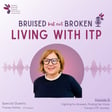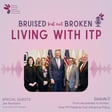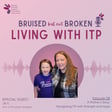ITP and Inherited Blood Disorders
00:00:00
Speaker
I think ITP can overlap with a couple different types of blood disorders um and they look very similar to ITP, but they're actually not ITP or they might have this inherited predisposition. So I like to think of these in two different categories, which is when someone just presents with low platelets and they don't really have any other features of a health concern or they have maybe low platelets plus another health concern.
00:00:26
Speaker
or they may have other physical features or other things that would point us more towards a genetic syndrome.
Introducing 'Bruised But Not Broken' Podcast
00:00:40
Speaker
Welcome to the PDSA podcast, bruised but not broken, living with ITP. The diagnosis of a bleeding disorder like immune thrombocytopenia may leave you wondering, how can I really live my life with ITP?
00:00:53
Speaker
PDSA's podcast, Bruised But Not Broken, Living With ITP, brings empowering stories, the latest research and treatment updates, lifestyle tips, and answers to the real-life questions the
00:01:19
Speaker
I'm glad you could join us today. We had a previous episode on what a genetic counselor is.
Meet the Genetic Counselors
00:01:26
Speaker
And today we have two guests, which I'm happy to tell you about. The first one is Jen Deramo.
00:01:35
Speaker
She is the Director and of Research and Canadian Advocacy at the PDSA. She is a certified genetic counselor with the Canadian Association of Genetic Counselors. And as a PDSA representative, Jennifer sits on the board of the National Rare Blood Disorders Organization.
00:01:59
Speaker
She is passionate about her work and she hopes to improve the lives of those living with ITP and their families. Also joining us today is Hannah Helber, who is a certified genetic counselor at Texas Children's Hospital and Baylor College of Medicine. She is a member of the Texas Children's Hematology Team, where she counsels patients and families with various hereditary hematologic disorders.
00:02:34
Speaker
Hannah is passionate about educating and supporting families with hereditary blood disorders. So welcome to both of you. I'm so happy to have you join us today. And hopefully we can clarify a little bit about genetics and genetic testing. So I know our previous episode, we went over the importance of having a very good family history. Jen, to start off with, tell me how you and Hannah got to know each other. Well, first off, thanks for inviting me to this podcast. And it's great to see you, Hannah. Hannah and I met I think a few years ago through the Inherited Hematological Consortium Genetic Counseling Working Group through Runks1. And then through that, she had mentioned that she was part of a ah benign hematology genetic counseling subcommittee through the National Society for Genetic Counselors. So she invited me to join for learning purposes.
00:03:33
Speaker
And I'm so glad I did because I've learned so much through listening to case studies and and learning from her experience. So it's been really valuable for me because as we talked about previously, I am a genetic counselor, but I never before coming to PDSA worked in the hematology space. So it's been such a pleasure getting to know Hannah and learning from her.
00:03:54
Speaker
Well, that's that's a good way to meet and to share information. And we're you're always growing, it sounds like, because you're attending seminars and and things so that you're your profession never gets stale because there's so much new out there all the time.
Journey and Passion in Genetic Counseling
00:04:09
Speaker
Hannah, tell me, tell us a bit about your background and how you became a genetic counselor. What type of patients do you get to see in your work?
00:04:20
Speaker
course and Thank you so much for having me and Jen it's so wonderful to have met you a couple years ago and to now be doing this podcast. So exciting. So my background is I mean I was always very interested in genetics so I went to college and I decided to major in molecular genetics, but I wasn't quite sure what I wanted to do.
00:04:40
Speaker
So I started learning a little bit more about genetic counseling from a research assistant position that I had, and I fell in love with it. At the same time that I was learning about genetic counseling, I realized that I probably should see a genetic counselor for my own family history of cancer.
00:04:58
Speaker
So I met with a genetic counselor to go over my family history, but she also knew I was interested in being a genetic counselor. So part of my appointment was her actually counseling me on becoming a genetic counselor too. Well, that was nice that you approached her about that because that probably helped guide you in the right direction.
00:05:16
Speaker
Absolutely. It was one of probably like the best healthcare care experiences and it really like fueled my passion for genetic counseling. So I attended Baylor College of Medicine for my training. And now I primarily see pediatric patients in our hematology center with any type of inherited blood disorder. And then also I am consulted on our cases of patients with ITP as well.
00:05:40
Speaker
Wow, that's great. And that's wonderful. That's hands on experience, especially when it comes to the people that are listening to our podcast that have ITP, you've got first line experience with them.
Understanding Genetic Counseling
00:05:53
Speaker
So which is wonderful, Jen, maybe you can go over a little bit about what a genetic counselor does from a simple perspective. effective Yeah, so I'm genetic counseling is more of a ah process of communicating information and going through risks and explaining you know what a condition is, what caused it, what kind of testing there may be, what the results may show, and really helping to kind of fit all the pieces of a puzzle sometimes times together and and working with a family to adjust to all the complicated medical and familial and psychosocial aspects of either having a genetic disorder or being at risk for one.
00:06:38
Speaker
then what is genetic testing and are there different types? Yeah, absolutely. So there are many different types of genetic testing, I guess three main types, but ultimately these are tests that can detect changes at the gene level or the chromosome level or the protein level.
Deep Dive into Genetic Testing
00:06:59
Speaker
But I think most people in our patient population so that you know have ITP and might be thinking about genetic testing They're probably more interested in what we call germline molecular testing. And through that type of testing, what you're looking for are germline abnormalities in the genetic code. So we all have a unique genetic code. And actually, our genetic code is made up of four different letters, A, T, C, and G. And they're arranged in a specific way. And so our body reads our genes like how we read a book. And so that's how the body
00:07:37
Speaker
knows how to grow and develop. So in the last episode, we talked about how genes are like blueprints. right And so how the genes get the information from, or how the body gets the information from the genes to grow and develop is through reading the gene. Sometimes though, there can be typos in the gene, right? And you can have typos that lead to maybe changes that you would never notice. So benign changes, or maybe changes that might be advantageous to you.
00:08:06
Speaker
And then sometimes you can find typos that um can increase your risk for health conditions or might explain a health health condition that you have. That's one of the reasons that the family history is so important because when you find in your family history that certain things pop up and if you had the genetic testing and maybe something would and make you think that maybe that would pop up in yourself or or something.
00:08:32
Speaker
I was just going to say, you know, sometimes you know, you think about the testing at a like of a certain gene or sometimes it's a a whole panel of different genes. Okay, well, it's very complicated. I i can tell that that's why we have professionals like you all to help explain it to us. all Hannah, let me ask you, I mean, when there, I know there are a lot of hematological blood disorders. Are there some that kind of would look like ITP, but they may not be? Absolutely. I think ITP can overlap with a couple different types of blood disorders. um And they look very similar to ITP, but they're actually not ITP, or they might have this inherited predisposition. So I like to think of these in two different categories, which is what someone just presents with low platelets.
00:09:24
Speaker
And they don't really have any other features of a health concern or they have maybe low platelets plus another health concern or they may have other physical features or other things that would point us more towards a genetic syndrome. And what are some of those disorders or diseases that would present like that?
00:09:43
Speaker
Something I see more often I think is a family history of suspected ITP and then it ends up being actually a bone marrow failure condition where there's an issue with the production of the blood cells. Including platelets, okay, okay. So that would be one. Are there other ones also that might present like that?
00:10:03
Speaker
There are some conditions actually where similarly to how some people are tall and some people are short, some people have a normal amount of platelets and some people just have lower platelets because of a genetic change. And so they may have lower platelets, but they don't have as many of the bleeding concerns or they may not have as many of the symptoms from that low platelet count. So that would maybe guide us towards less medical intervention, whereas a problem with the bone marrow would maybe cause us to do a little bit more. More testing. More testing for medical management.
00:10:33
Speaker
Right. When genetic testing is done, what would you call the advantages or the burdens or even like limitations of having it done? Yeah. And I think it's important though to acknowledge that, you know, what a benefit might be to one person might be a risk to someone else. So these are kind of subjective, but overall, you know, I think sometimes the benefit can be that You know, knowledge is power. Maybe there's something you can do with that to proactively plan or prepare. You know, sometimes for it, depending on, you know, what the testing is for, it might explain a collection of symptoms. So it might be very validating. It might end a diagnostic odyssey and it may be helpful in the family to have a diagnosis. Sometimes some of the risks and limitations, again, knowing that they're subjective can be that for some people it can cause anxiety.
00:11:27
Speaker
and a mental health condition by constantly being worried about being at risk for something. And one of the major limitations of genetic testing is that while it can maybe give you an answer about, you know, what you may be at risk for, it can't tell you the day that you're going to get symptoms and how severe it will be and and things like that. So there are some limitations there. And so sometimes people can really worry about that, you know, and sometimes you find things that are unexpected and that can be stressful too.
Challenges of Genetic Testing Interpretation
00:11:58
Speaker
And then I think too, sometimes there's a risk that it can change the dynamics in the family. So with some genetic conditions, there may be a lot of guilt and shame involved with having that disorder in the family. And sometimes knowing or sharing a diagnosis in the family can change the way people treat you. So those are some of the things that over the years I heard my patients share about the advantages and risks. But again, they're very subjective because it is it depends on the individual.
00:12:28
Speaker
Right. And one thing I've, I've heard too is just because something shows up, like you said, Jen, it doesn't tell you when it's going to happen or, or even if it's going to happen, is that correct? Or, or is it? Yeah. Okay. So because it might show that you've got this in your genetic profile doesn't necessarily mean a confirmation that this is going to happen in the future.
00:12:54
Speaker
Yeah, I think it depends too on what the condition is, because there are some conditions where if you the genetic test will, it means at some point in your life you will get this. But there are other things where, yeah, there can be a whole constellation of symptoms, but that doesn't mean you're going to get everything or even any of them. Again, that's all part of the limitations.
00:13:15
Speaker
Well, i I like the term you use, genetic or diagnostic odyssey, because I think a lot of patients and people in general, especially as you're getting older, you have peculiar symptoms. you've got If you write them all down, you might have 10 symptoms. They don't tend to all be cohesive into a diagnosis, but possibly Like you mentioned, if you had a genetic panel done that showed something, it would say, hey, this is what it is. And and I'm I'm assuming then that Hannah is a genetic counselor, you would go over that diagnosis and you would say, these are the symptoms that people experience when they have this. And that's what you're experiencing and you know now. And we've got your answer. So that would be a big relief. I mean,
00:14:09
Speaker
If it was me, I think that would be a relief.
Deciding Factors for Genetic Testing
00:14:12
Speaker
Hannah, when would a patient with a low platelet count consider having genetic testing done, especially because we're talking about ITP? We know what our symptoms are when we're an ITP patient, but when would you think that they might need to go a step further and and get some genetic testing?
00:14:32
Speaker
Yeah, I think the best time to consider genetic testing is when something in the workup doesn't quite fit with the diagnosis of ITP. So I think it can be helpful to think of this as maybe ITP plus another health cancer. concern So it like maybe a heart problem or a lung problem, something that maybe it doesn't seem related to ITP, but it raises a red flag for us to think about an inherited predisposition. Or ITP plus a family history of ITP. That's kind of would be a little bit unusual.
00:15:02
Speaker
And so this is also, I think, where the partnership between your genetics provider and your hematology provider is crucial. I mean, I rely heavily on my team members to raise those red flags when maybe someone isn't responding to first-line therapies or has increased or decreased bleeding symptoms, maybe not as common with ITP, or something about their lab that values just doesn't quite fit.
00:15:26
Speaker
which is important to know that your healthcare care provider, your hematologist, is aware of the specific signs that they would look for in possibly considering another diagnosis. Because honestly, as an ITP patient, I think we never stop thinking about How did I get this? Why did I get this? And will I ever find an answer? And you're always questioning yourself, what did I do to to get this? you know Did I do something? So possibly when you have the genetic testing.
00:16:01
Speaker
If it had an answer for you, it'd probably be a relief to some people, to a lot of people. But which test panels are best? I know that there's a lot of different types of test panels. You just don't go into the total testing, correct? I mean, wouldn't you just go towards a certain type? What type would that be, Hannah?
00:16:23
Speaker
I think not all panels are created equal. And I think you're totally right. There are so many different types of thrombocytopenia panels that are looking at this certain subset of thrombocytopenia genes versus this other subset. And that's where it's really important that the provider ordering your testing picks the panel that has all the genes of interest based on the symptoms and how a patient presents. Okay. And they may even have to consult with a geneticist in order to determine that Or is that something that that a geneticist would see the patient and determine on their own? Or is it something that your hematologist can also order? How does that normally work? Or is it a mixture of both?
00:17:09
Speaker
I think it's definitely very dependent on the center and the hematologist's comfort with ordering genetic testing. But geneticists or genetic counselors are able to help order this type of testing, or some hematologists will also order it as well.
Insurance and Genetic Testing Costs
00:17:25
Speaker
One question I know that people are always concerned about because health care is so expensive. And Jen, you're in Canada. And Hannah, you're in the US.
00:17:37
Speaker
Hannah, how does or does insurance cover these tests? So genetic testing, I would say we've seen is increasingly better covered by insurance. And we're seeing this improve over time. It still is very much here in the United States plan dependent. So your specific insurance plan and whether or not they cover genetic testing. So you really should check with your insurance before having it done, because is it still quite expensive?
00:18:06
Speaker
It can be really expensive and that's that cost really depends on where you sit with your deductible for that year and your out-of-pocket cost. So I always encourage families to be proactive in their genetic testing journey to reach out to their insurance provider. And we also help with this as genetics providers too, trying to understand where they're at with their out-of-pocket cost and their deductible to really set like a cost expectation the best we can.
00:18:35
Speaker
and to make sure that this is something that's manageable for the family. Well, that's good because you hate to have that additional burden on the family. The last thing we want is a surprise bill. Right. Right. Right. And Jen, what about in Canada? How is that covered? Most people are referred to a genetics clinic because it's a medical indication. And so it is almost always covered. But if you're going more the private route where you're doing this outside of a genetics clinic or outside of the help of your physician, ah your primary physician, then there are costs associated with that. But that's more kind of considered like the private setting, the standard healthcare system in Canada will cover genetic counseling. Okay, that's good. And I would think when you're talking about private
00:19:23
Speaker
testing. It's probably somebody who's just curious, you know, about and there's not really a medical need for it. But if if it's available, they might go ahead and say they want to do it. Sometimes. Yeah, for sure. Like you're talking about the direct to consumer testing and things like, you know, ancestry testing, which, you know, isn't really considered genetic testing in a standard way. So yeah, that that type of thing. Sure, there'd be costs.
00:19:51
Speaker
Yeah, most most services are covered in Canada because they're medically indicated. So there's a reason why you're pursuing genetic testing. Now, along those lines, do you ever find discrimination with genetic testing? Yeah, absolutely. And I think, you know, there are differences in the states and in Canada. You know, I know most of our patient population is in the US. So When you say our patient population. I mean, ITP patients. And you're talking about the PDSA membership. Yes. is it Because we're based in the United States. Yeah. OK.
Legal Protections in Genetic Testing
00:20:26
Speaker
So there is a Genetic Information Non-Discrimination Act. So the acronym is GINA. And it was created so that people were not discriminated in their employment setting and health insurance to if they wanted to pursue genetic testing and they didn't want to be discriminated against.
00:20:44
Speaker
But the shortfalls of Gina, and I'm sure Hannah can fill in the blanks if I leave anything out, but there are you know some areas where it doesn't cover. So I don't believe it covers life insurance, disability insurance, or even long-term care. Yeah, I think there are certain instances with like like you were saying with life insurance and disability where Gina doesn't provide coverage. There are also some smaller caveats that maybe are less applicable to most people, like you know working at a company of less than 15 people or working for the federal government, having Native American insurance. So just knowing those things prior to proceeding with genetic testing and thinking through those protections are in place for only certain things is an important part of the genetic testing process. ah Okay, so that's something definitely like when a patient is considering genetic testing that a genetic counselor would go through
Case Studies and Misdiagnosis
00:21:33
Speaker
with them. So it's all part of that informed decision-making process.
00:21:37
Speaker
Which makes sense. That sounds like what you're doing really brings it all together for the benefit of the patient, but also getting to that point to getting the testing and everything sounds terrific. Hannah, since you work with patients, do you have any examples of patients that are cases that you may have worked with, which maybe ITP was first diagnosed and then it ended up being something different?
00:22:03
Speaker
I do. So I have a couple examples, actually. The first one is a patient who had presumed ITP and chronically low platelets forever. But when we looked more closely at the complete blood count, we actually noticed that they have large platelets as well as their mildly low platelet count. And genetic testing was an easy way to clear up that this is actually a macrothrombocytopenia condition, which basically just means large platelets.
00:22:31
Speaker
and they're low. These patients are always going to flag a CBC as having lower platelets, which might make people really nervous, but it doesn't typically require major medical intervention. They may not have any bleeding symptoms at all. It's typically just that we're going to see they have low platelets on a CBC. And I think that's helpful to know because it kind of drives us away from doing too many unnecessary medical interventions for those patients. In this case, was it that all of their platelets are large?
00:23:00
Speaker
And then they have a low count because of that? Yeah, typically ah they have the several large platelets and then they have the low count as well. Okay. Cause I know ITP patients frequently will show in their CBC giant platelets or large platelets, but it's been explained to me that actually it's because your bone marrow knows that you don't have enough platelets circulating. So it releases your platelets early.
00:23:28
Speaker
And those are like immature platelets, which sounds kind of strange that the immature platelets are big. Whereas the other platelets are irregular platelets have a a smaller size. But I know my hematologist has said those big platelets, they work very well. They're healthy. I'm sure that's a relief, especially since this patient didn't have the typical ITP symptoms to clarify that yeah definite was good. And you said you had another instance too.
00:23:57
Speaker
Yeah, I found another case where a patient was born to a family where where there was a family history of ITP. This patient actually had low platelets at birth, and the family history of ITP raised some questions about whether or not this was actually an inherited thrombocytopenia.
00:24:13
Speaker
And in this case, genetic testing identified the patient actually had an inherited thrombocytopenia that predisposed to blood cancer or leukemia in the future. And this drastically shifted the medical management for this patient and actually ended up going on to bone marrow transplant due to this predisposition. So this is something where had we called this ITP, we would have missed this predisposition to blood cancer in the future.
00:24:40
Speaker
Wow, that's a really big deal.
Is ITP Hereditary?
00:24:43
Speaker
We also had asked some questions on social media about genes and genetic testing if somebody had a question. And um Kim asked, if I have ITP, does that mean that my kids will get it? I think it really depends. ITP is a diagnosis of exclusion, and it's not always possible to rule out all those causes. So sometimes over time,
00:25:09
Speaker
more clues may pop up. Maybe there's family history or maybe there's something in your own unique clinical history that then might be a red flag to figure other things out. But I would say most of the time, ITP is ITP. But sometimes it can be more than that, but it can be really difficult, you know, right at diagnosis sometimes to to understand that. Hannah, do you think it's something that this mom with ITP could give to her kids. I mean, she's concerned about it. Should she be concerned about it? I agree with Jen. I think most of the time, ITP is ITP. There are these smaller subset of cases where genetic testing can be helpful, but I think that's also a
00:25:53
Speaker
very common feeling as a parent when we're diagnosed with something. The first thing we think of is usually not ourselves, but our children. ah right So I definitely empathize ah with with Kim and I think this is a great question to ask. And I'll share something about myself. When I was pregnant, I i had a platelet count of 16,000 when my daughter was born. And When she was born, her platelet count was 16,000. And after five months, she had a perfectly normal platelet count and has never had any problem at all. And the feeling is that the anti platelet antibodies that my body was producing across the placenta into the baby. And that's what caused her low count. And my understanding is you don't know for sure if that's going to happen or not.
00:26:47
Speaker
But once those antibodies died, she was able to produce plenty of platelets. And, you know, she's a grown woman now with children. So she's been healthy and happy over her whole life. That was a situation of me and thinking.
00:27:03
Speaker
Oh no, am I giving it to my children? But my doctors reassured me and the pediatric hematologists assured me, you know, no, this will probably go away. And sure enough, every time we had her blood drawn, the platelet count little by little went up until it was normal. So hope for the moms out there that might be pregnant with ITP.
Episode Conclusion
00:27:23
Speaker
In that situation, we are going to have a future episode on pregnancy and ITP. So you'll have to stay tuned in for that. but That ends us for today, and I can't thank Hannah and Jen enough for sharing your wisdom and explaining all about this genetic testing conundrum that some of us might be thinking about and thinking, is it necessary? Is it not? Like Jen mentioned, most ITP patients, they're diagnosed with it, and that's what it is. They don't really need to look any further.
00:27:59
Speaker
if there's extenuating circumstances and it might be something you want to discuss with your doctor. But thank you again. Thank you. Bye. Bye bye.
00:28:15
Speaker
How do you live your life with a bleeding disorder like ITP? From working in the kitchen with knives, to navigating sharp corners in your house, going out to eat in a restaurant, traveling on a plane, attending a sporting event, even dancing at a wedding. ITP patient, Arbor Pruitt, shares her tips and tricks for moving through life with ITP for more than 60 years. Here's her lifestyle lesson for the day.
00:28:45
Speaker
Have you ever wondered why you get the same type of bruises in the same places on your body? Well, I'm here to tell you that it happens and what you need to do is kind of be a detective. I think most ITP patients are kind of a detective in a way. We're always wondering about what did I do to make my count go down? What did I eat? What did I breathe? What did I do?
00:29:12
Speaker
Well, when it comes to bruises in the same place, you've obviously are hitting yourself or injuring yourself in the same spot repetitively. So you have to kind of slow down and figure out why is this happening and be very aware of when you are hitting that area.
00:29:34
Speaker
Case in point, my left hip used to get a bruise on it. all It seemed like all the time. Well, when I finally stopped to try to figure out why, I realized that when I came in from the grocery store with bags in both arms, and I'd walk up to the door the from the garage that would lead into the house, since I didn't have a hand to open the door, I would hit the door with my hip.
00:30:02
Speaker
And that is where I was constantly getting a bruise. So be a little bit of a detective, slow down, think about it, and pay attention. And once you figure it out, you'll know how to avoid it in the future.
00:30:25
Speaker
Thanks for listening to the PDSA podcast, bruised but not broken, living with ITP. made possible by our presenting sponsor, Amgen. Special thanks to Gus Mayorga for composing our theme music. To see what's coming up, visit our website at pdsa dot.org and subscribe wherever you get your podcasts. Please share this podcast through social media with anyone who you think might benefit from the information and stories we share with the ITP and other platelet disorders community.
00:31:00
Speaker
As always, please speak with a health care professional before making any treatment decisions. But know that PDSA dot.org is a wealth of information and resources to help you navigate life with ITP and other platelet disorders.
00:31:17
Speaker
Remember, you are not alone.


